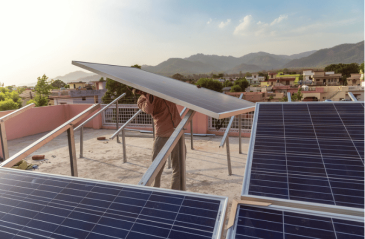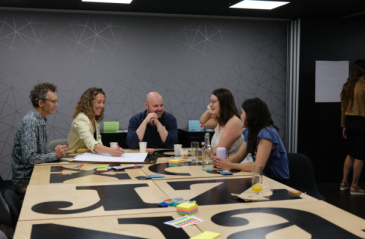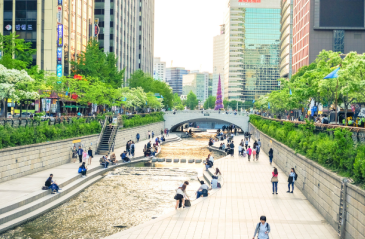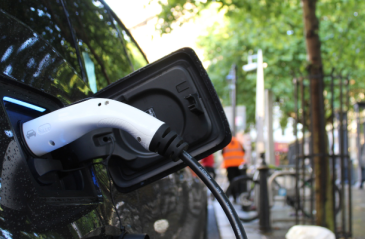
The power of storytelling in climate leadership

If it was its own economy, the Mediterranean would be the fifth largest in the region
Share articleThe Mediterranean’s natural asset base is fast eroding due to unsustainable exploitation
Share articleWe urgently need to move towards a sustainable economic model for the Mediterranean
Share articleWe put our vision for government into practice through learning partner projects that align with our values and help reimagine government so that it works for everyone.
July 29 2017. Just another day, right? Actually, for anyone like me who lives in France it was a date to be circled in the calendar. This is because it was predicted to be the worst day for driving, the time when July's holidaymakers returning home combined with those who prefer to get away in August.
The routes heading to and from the beaches of the Mediterranean were particularly clogged with traffic - but that's no surprise. The summer exodus to its shores happens every year and this is by no means confined to France - similar patterns repeat themselves across Europe and from further afield as thousands flock to its sandy beaches and crystal-clear waters.
The Mediterranean, however, is far more than just a summer tourist destination. Along its 46,000km coastline there are some 21 countries and around 150 million people. The sea brings security by supporting livelihoods and providing food, as well as delivering other benefits such as climate regulation and spiritual and cultural enrichment.
Its economic benefits are also extensive. The economic value of ocean-dependent activities in the Mediterranean - the gross marine product (GMP) - is estimated to be $450 billion annually. This means that if it was its own economy, the Mediterranean would be the fifth largest in the region - bigger than most of the region's national economies - generating about as much annual economic output as Algeria, Greece and Morocco combined. Furthermore,the overall value of its natural assets that underpin the GMP (including productive coastlines, fisheries and seagrass) is at least US$5.6 trillion..
So much for the good news. Unfortunately, there are some storm clouds gathering. The Mediterranean's natural asset base - which supports much of the economy and community wellbeing - is fast eroding due to unsustainable exploitation. We are killing the golden goose! That's why the World Wildlife Fund - with some assistance from The Boston Consulting Group - has written a report on reviving the economy of the Mediterranean. So, what do we suggest?
We propose six priority actions - to be implemented at both regional and national level - that would enable a transformational change towards a sustainable economic model for the Mediterranean.
Firstly, we suggest that the management of a natural resource system as complex as the Mediterranean requires integrated and ecosystem-based ocean planning and supervision. The ecosystem approach considers the needs and interactions of the entire ecosystem, including human activities, in order to ensure that ecological processes and functions are maintained. It also accounts for economic and social benefits, as well as environmental stewardship concerns.
Secondly, we call for a sustainable “Blue Economy” approach to be adopted. We need to ensure that economic activity does not have a negative impact on the marine ecosystem. Although developing an economy based on the resources of the oceans is increasingly seen as the new frontier, it must be done in line with sustainable principles to achieve its maximum long-term economic potential. For example, Blue Economy investment and development must aim to achieve a zero net emissions world.
Our third recommendation is to achieve climate-resilient and carbon-neutral economies. Countries should invest in carbon-neutral policies to enhance their development potential. Carbon finance mechanisms, such as Payment for Ecosystem Services, can enhance the value of living natural assets. Mediterranean seagrass beds, for example, are among the most efficient ecosystems for sequestering carbon. Countries should therefore invest in carbon neutral policies to enhance their development potential.
The fourth idea is to unlock the sustainable productive potential of natural assets through public and private funding. It is important to introduce financing mechanisms that drive sustainability standards in the Mediterranean. This means that sustainable development guidelines for investment should be adopted and implemented regionally, and governments should promote investments in sustainable business models to encourage their adoption.
The fifth priority is to reduce the footprint of mass tourism and pursue more sustainable tourism models. Tourism represents 8 million jobs directly and 28 million indirectly in the region. But while tourism is still growing at almost 3% per annum in the region, it's happening through ever-increasing volumes and degradation, and despite ever decreasing revenues per tourist. With increasing global competition, there is a risk that the Mediterranean will get caught in a race to the bottom. At the same time, new generations of tourists care more about sustainability and authenticity. There is an opportunity for the Mediterranean destinations to develop a long-term view focused on taking advantage of the unique environmental and cultural assets in the region.
And our sixth and final recommendation is to ensure sustainability of the fishing sector. Although 80% of fish stocks are overfished in the region, it's been shown that a scientific approach based on ecosystems can help recover healthy stocks. The rules that apply to industrial fisheries should also be applied to semi-industrial and recreational fisheries. Consumers, too, can also play a role, but they need to be better-informed about the impact of their purchases.
It's important to remember that oceans are critical for life on earth. Half of the oxygen we breathe is produced by marine ecosystems, and they absorb one third of all carbon emissions. We dare not risk ruining this most precious of resources - it's time to reverse course and move towards safeguarding and strengthening the Mediterranean for both this generation and the next.
Want to read more? Then check out Reviving the Economy of the Mediterranean Sea












